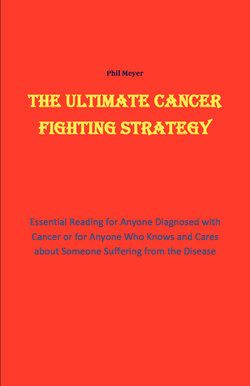Читать книгу The Ultimate Cancer Beating Strategy - Phil Meyer - Страница 8
На сайте Литреса книга снята с продажи.
CHEMOTHERAPY
ОглавлениеThe fact that you are reading this book probably means that, like me, you have doubts about the benefits of chemotherapy as a treatment for most cancers. I have not done much research on these agents but I have seen friends and associates die from what I firmly believe was the chemotherapy.
An ex colleague was diagnosed with cancer after the biopsy of a growth in his groin. The growth was removed and he was put on chemotherapy. I watched a supremely fit individual lose his hair and his vitality. His body retained water causing him to swell alarmingly and his skin turned a yellow colour. They continued poisoning him until he died a few months later. Throughout his treatment I knew in my heart that they were poisoning him to death and decided that if I was ever diagnosed with cancer, chemotherapy would not be a consideration for me.
I accept that for some cancers, chemotherapy provides an acceptable treatment if they are detected at an early stage. I understand that testicular cancer and some blood cancers respond well to certain of these agents. If you have one of these cancers then you probably need to proceed as directed by the oncologist. In most other cases you need to vigorously question the use of these poisons. We all know that they are designed to destroy cancer cells but they also destroy the body’s own immune system. If the poison does not kill every cancer cell, you can be sure that those cancer cells which withstand the therapy are particularly strong, resilient and deadly. Your immune system however, does not withstand the treatment. What you end up with (after the treatment) is an invading army of cancer “super cells” coming up against an immune system which is itself on life support. You are totally exposed and will almost certainly end up with a poor outcome (after suffering all of the horrific side effects of the so called treatment). The medical profession then shakes its head and pronounces that the brave patient lost the battle with cancer. I would add (from my layman’s perspective) that they were complicit in this since they destroyed the patient’s own defences. Please ask any practitioner who suggests a harmful treatment, whether this treatment has ever resulted in a cure for anyone. He needs to supply statistics from a reputable source. The cure rate for these harmful and debilitating chemicals is unacceptably low. Research this and look at the statistics. Ensure that you understand the meaning of the terms used. Having a few periods of “remission” before eventually dying can in no way be categorised as success.
I cannot advise you to choose one treatment regime over another. You are going to make that decision yourself. What I can advise is to approach the matter with knowledge and facts. A long term survey of 800 cancer patients (with 30 types of cancer across their number) who refused all conventional treatment for the disease, found that refusal shortened the median length of survival by nine months. Bear this in mind as you read this book. These were patients who did nothing about their disease. They had no regimen of eliminating toxins, reducing stress, de-acidifying their systems, changing diet, introducing remedies etc. They continued living as normal and still survived only nine months short of their chemically treated comparison group. These are averages derived over a long period of time. The treated group went through hell for that small period of extra time and then died anyway. How much better could the refusers have done had they adopted a simple plan of action from the pages of this book? I believe that they could have beaten the treated group in every single way (longevity, quality of life, happiness etc). I can’t prove this of course but I am certain of it. The choice for anyone with cancer should not be between chemotherapy and doing nothing. It must be between chemotherapy and adopting a powerful, safe, multi-faceted approach from options such as those mentioned in this book.
